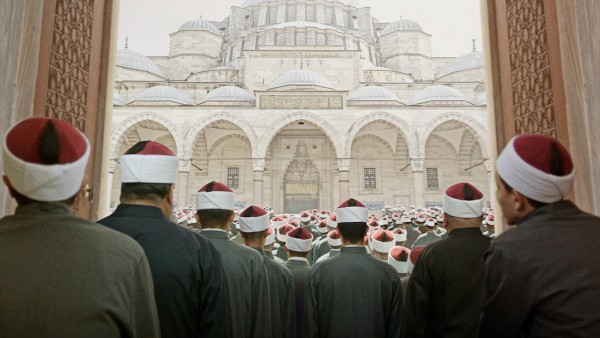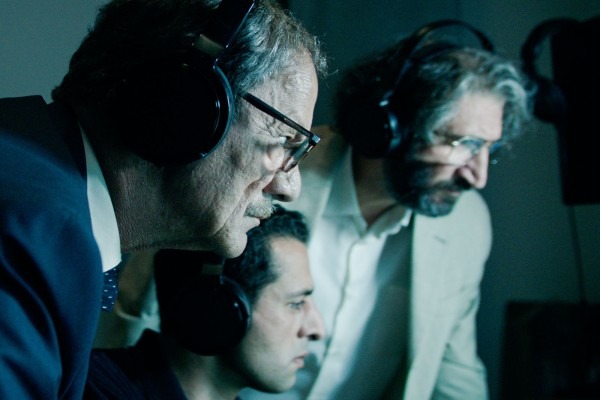You were born in Sweden to an Egyptian father. The fact of having had one foot in the social fabric here and elsewhere has certainly enriched you with eclectic references. This allows you, as a filmmaker, to have a different look at the contemporary realities of Egypt…
Absolutely. This is a very important point to raise because we can clearly see that most of the notable filmmakers, who have really brought something new and developed the seventh art throughout the world, come from, in one way or another, of a migratory experience, themselves or through their family history over generations. This particular story marks forever. It is so strong that through it, this type of director remains above the grip of zealous nationalism. When we are too proud of where we come from, without knowing why, without the humility that must go with it and above all without having accomplished anything, we defend a certain belonging because it rather allows certain privileges, then we should be ashamed.
I don’t have that feeling. I am very attached to particular places, places and spaces that mean a lot to me. I love Alexandria, Cairo, Casablanca, Stockholm and other parts of this wide world. An important thing for me is to continually remember Billy Wilder, Martin Scorsese or Francis Ford Coppola as great filmmakers and children of immigrants. If Coppola tells the story of the American dream, in “The Godfather”, it is of course because he knows what it is to be a family of immigrant origin. He lived through the struggle to build a descent life. He obviously has things to say about the United States that an ordinary American cannot tell. When an individual who carries in him this diversity which is a richness, and the pains which also go with it, he unquestionably carries a different glance on the society within which he lives or grew up.
Each time you succeed in recomposing the space from another. In 2017 in “Le Caire confidential”, you reconstructed the Egyptian capital from Casablanca. In “The Cairo Conspiracy” you go further and recreate the city from Istanbul, until you reproduce al-Azhar. In your opinion, is this the ability of cinema to operate a form of magic?
This translates in a very particular way one of my deepest wounds, as a director. I am obsessed with filming in Egypt and in Cairo, which is so close to my heart. I was rejected, so I always kept in mind the idea of reproducing this city in Casablanca, in this Morocco that I love so much and where I’m always happy to come back. I scrutinized every little alley, every avenue, which could be Cairo in my films. This creates a beautiful communion in belonging or recognizing places that we all care about. Moroccan spectators like to have fun trying to find clues about their city Casablanca and my friends from Cairo like to find their spaces elsewhere. The whereabouts of either are unclear, but we share that sentiment. In terms of production, on the other hand, it requires a substantial budget, but the result is pleasant.
Since I was forced to leave my country of origin and at each strong moment when the wound wants to take over, I look at my film characters. I wonder what they would have done in my place. For “Le Caire confidential”, I started filming two weeks after the birth of my first daughter. I was very vulnerable emotionally. I still wanted to see her again and see her grow, so I opted for Casablanca as an open-air set, trying to find what could be most marvelous in this artistic approach. I thought back to Federico Fellini, who was never able to shoot in his home town. Yet he recreated it elsewhere, with the wonder it aroused among the locals.
“The Cairo Conspiracy”, a film by Tarik Saleh
For “The Cairo Conspiracy”, I knew from the writing that I could not film in Cairo. So I decided to create a fictional version of al-Azhar. It was very important for me to start from a fiction to paradoxically put my finger on a reality. Moreover, this film was going to be shot in Morocco too, but we were overtaken by the health crisis at that time and the conditions of travel in compliance with the measures put in place were going to be very restrictive for us, which need to locate elsewhere. The choice fell on Turkey, at the beginning, especially for the facilities we could have in terms of filming despite the Covid-19. When I visited the Süleymaniye Mosque in Istanbul, I discovered a fascinating space. I was struck by the beauty of an architectural masterpiece. My special effects adviser offered me solutions to not change anything physically, but while taking the artistic and creative freedom to decide that it will be al-Azhar, in my film, thanks to advanced techniques.
There are political and religious powers, both of which impose a certain reading of realities. Do you think that cinema has this ability to create spaces for artistic expression, where we can address these questions in their complexity, without doing so from an ideological scope?
Absolutely. You are pointing here to a very important dimension of what cinema is, first of all for a director and above all for a creator like me, who has accumulated several experiences between here and elsewhere. As a filmmaker, I take the side of the human, at a time when many of us around the world are fond of conspiracies, especially in our Arab region. Conspiracy is what you might call wishful thinking. It is the phenomenon by which one recognizes those who have no power and who try to place it elsewhere.
 “The Cairo Conspiracy”, a film by Tarik Saleh
“The Cairo Conspiracy”, a film by Tarik Saleh
It’s nice to believe that people in power are powerful, when sometimes they themselves can be orchestrated by those around them. There are failures of leadership, failures of governance, so if there is a conspiracy, we recognize that there is a failure behind it. My job as a director is to say that our leaders are ultimately human beings like us. They get carried away, they have an excess of zeal, an uprising can be provoked, but often, one is not eliminated by his frontal enemy but by his close friend.
This is where for me the most important message in this film is to show how the security character Ibrahim does not stand against the Muslim Brotherhood in the first place, but against his superior, who is lawless, a psychopath who cannot reconcile his collaborators. It’s interesting to analyze the perception of things that someone who is hated by everyone can have, even when you can be one of those who are far from loving him.

